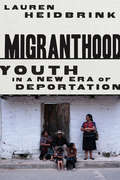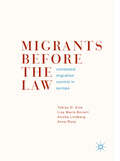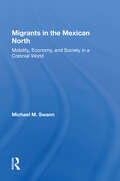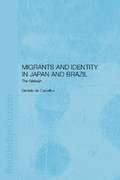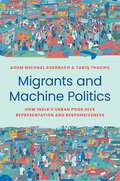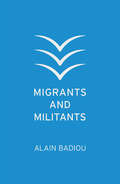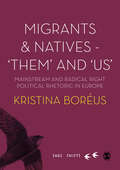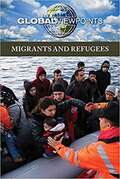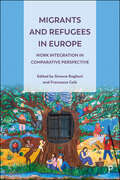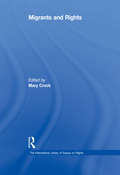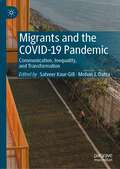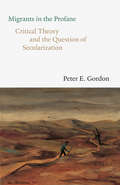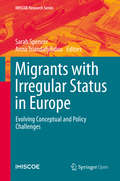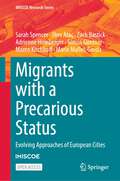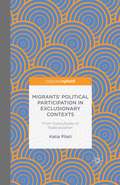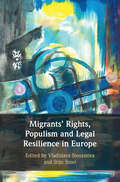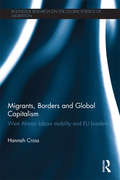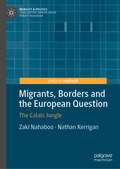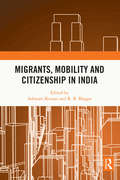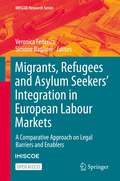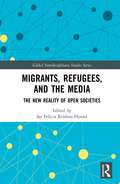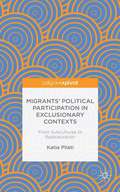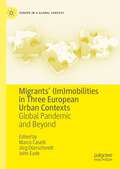- Table View
- List View
Migranthood: Youth in a New Era of Deportation
by Lauren HeidbrinkMigranthood chronicles deportation from the perspectives of Indigenous youth who migrate unaccompanied from Guatemala to Mexico and the United States. In communities of origin in Guatemala, zones of transit in Mexico, detention centers for children in the U.S., government facilities receiving returned children in Guatemala, and communities of return, young people share how they negotiate everyday violence and discrimination, how they and their families prioritize limited resources and make difficult decisions, and how they develop and sustain relationships over time and space. Anthropologist Lauren Heidbrink shows that Indigenous youth cast as objects of policy, not participants, are not passive recipients of securitization policies and development interventions. Instead, Indigenous youth draw from a rich social, cultural, and political repertoire of assets and tactics to navigate precarity and marginality in Guatemala, including transnational kin, social networks, and financial institutions. By attending to young people's perspectives, we learn the critical roles they play as contributors to household economies, local social practices, and global processes. The insights and experiences of young people uncover the transnational effects of securitized responses to migration management and development on individuals and families, across space, citizenship status, and generation. They likewise provide evidence to inform child protection and human rights locally and internationally.
Migrants Before the Law: Contested Migration Control in Europe
by Tobias G. Eule Lisa Marie Borrelli Annika Lindberg Anna WyssThis book traces the practices of migration control and its contestation in the European migration regime in times of intense politicization. The collaboratively written work brings together the perspectives of state agents, NGOs, migrants with precarious legal status, and their support networks, collected through multi-sited fieldwork in eight European states: Austria, Denmark, Germany, Italy, Latvia, Lithuania, Sweden and Switzerland. The book provides knowledge of how European migration law is implemented, used, and challenged by different actors, and of how it lends and constrains power over migrants’ journeys and prospects. An ethnography of law in action, the book contributes to socio-legal scholarship on migration control at the margins of the state.
Migrants In The Mexican North: Mobility, Economy And Society In A Colonial World
by Michael M SwannOriginally published in 1989, this study looks at the emigration and migration of people, including to and between urban centres, in 18th century Spanish American history.
Migrants and Identity in Japan and Brazil: The Nikkeijin
by Daniela de CarvalhoEconomic and social difficulties at the beginning of the 20th century caused many Japanese to emigrate to Brazil. The situation was reversed in the 1980s as a result of economic downturn in Brazil and labour shortages in Japan. This book examines the construction and reconstruction of the ethnic identities of people of Japanese descent, firstly in the process of emigration to Brazil up to the 1980s, and secondly in the process of return migration to Japan in the 1990s. The closed nature of Japan's social history means that the effect of return migration' can clearly be seen. Japan is to some extent a unique sociological specimen owing to the absence of any tradition of receiving immigrants. This book is first of all about migration, but also covers the important related issues of ethnic identity and the construction of ethnic communities. It addresses the issues from the dual perspective of Japan and Brazil. The findings suggest that mutual contact has led neither to a state of conflict nor to one of peaceful coexistence, but rather to an assertion of difference. It is argued that the Nikkeijin consent strategically to the social definitions imposed upon their identities and that the issue of the Nikkeijin presence is closely related to the emerging diversity of Japanese society.
Migrants and Machine Politics: How India's Urban Poor Seek Representation and Responsiveness
by Tariq Thachil Adam Michael AuerbachHow poor migrants shape city politics during urbanizationAs the Global South rapidly urbanizes, millions of people have migrated from the countryside to urban slums, which now house one billion people worldwide. The transformative potential of urbanization hinges on whether and how poor migrants are integrated into city politics. Popular and scholarly accounts paint migrant slums as exhausted by dispossession, subdued by local dons, bought off by wily politicians, or polarized by ethnic appeals. Migrants and Machine Politics shows how slum residents in India routinely defy such portrayals, actively constructing and wielding political machine networks to demand important, albeit imperfect, representation and responsiveness within the country’s expanding cities.Drawing on years of pioneering fieldwork in India’s slums, including ethnographic observation, interviews, surveys, and experiments, Adam Michael Auerbach and Tariq Thachil reveal how migrants harness forces of political competition—as residents, voters, community leaders, and party workers—to sow unexpected seeds of accountability within city politics. This multifaceted agency provokes new questions about how political networks form during urbanization. In answering these questions, this book overturns longstanding assumptions about how political machines exploit the urban poor to stifle competition, foster ethnic favoritism, and entrench vote buying.By documenting how poor migrants actively shape urban politics in counterintuitive ways, Migrants and Machine Politics sheds new light on the political consequences of urbanization across India and the Global South.
Migrants and Militants
by Alain BadiouThe question of migration has come to dominate the news agenda in many countries, but what does the word ‘migrant’ really mean today and how should we respond to those who are labelled ‘migrants’? In this short book Alain Badiou argues that our way of thinking about migration should be governed both by an ethical duty to welcome the migrant in the name of hospitality and also by the urgent need to put an end to the global capitalist oligarchy that has produced the migrant as a figure of contemporary crisis. For the ‘migrant,’ argues Badiou, is in fact a nomadic proletarian. Today, our homeland is the world, and any meaningful politics must include those who come to us and who represent the universal nomadic proletariat. Writing with the rigor, clarity, and polemical flair that have made him one of the world’s most influential philosophers, and drawing on a rich body of material including contemporary poetry and the words of an anonymous migrant, Badiou develops a powerful riposte to those who have stoked the fear of migrants and exploited the migration question for political ends.
Migrants and Natives - ′Them′ and ′Us′: Mainstream and Radical Right Political Rhetoric in Europe (SAGE Swifts)
by Kristina BoréusIn light of the recent global resurgence of radical and populist right-wing parties, this book examines hostile and anti-immigration rhetoric in Europe. Topical and timely, it deftly guides the reader through the trajectories of radical right parties and contextualises discriminatory rhetoric in wider immigration and integration politics. Grounded in a focussed, comparative critical discourse study that draws on methods from social science and linguistics, the book: Presents a study of political rhetoric on migration in several European countries over the past thirty-five years, drawing out similarities and differences. Explores anti-immigration rhetoric before and after the 2015 refugee/solidarity crisis. Illuminates the role of so-called ‘mainstream’ parties in developing and legitimising discriminatory rhetoric. Exposing the insidious nature of malevolent political rhetoric and its consequences, this book is a timely and essential read.
Migrants and Natives - ′Them′ and ′Us′: Mainstream and Radical Right Political Rhetoric in Europe (SAGE Swifts)
by Kristina BoréusIn light of the recent global resurgence of radical and populist right-wing parties, this book examines hostile and anti-immigration rhetoric in Europe. Topical and timely, it deftly guides the reader through the trajectories of radical right parties and contextualises discriminatory rhetoric in wider immigration and integration politics. Grounded in a focussed, comparative critical discourse study that draws on methods from social science and linguistics, the book: Presents a study of political rhetoric on migration in several European countries over the past thirty-five years, drawing out similarities and differences. Explores anti-immigration rhetoric before and after the 2015 refugee/solidarity crisis. Illuminates the role of so-called ‘mainstream’ parties in developing and legitimising discriminatory rhetoric. Exposing the insidious nature of malevolent political rhetoric and its consequences, this book is a timely and essential read.
Migrants and Refugees
by M. M. EbochThe images are shocking and upsetting: drowned children washing up on beaches, dozens of dead bodies being pulled out of tractor trailers, a mass of humanity penned up in detention camps and tent cities, anti-immigrant rallies characterized by fearful and hate-filled invective. Yet there are also images of refugees being embraced by ordinary citizens and welcomed into their countries, their communities, even their homes. <p><p> What to do about a growing and endemic refugee crisis and migrant labor population in an age of globalization, terrorism, and income inequality is a question with no simple answers. This volume presents the widest possible range of opinions from reputable sources across the political spectrum and encouragers readers to consider all viewpoints before formulating their own reasoned and informed perspective.
Migrants and Refugees in Europe: Work Integration in Comparative Perspective
by Simone Baglioni and Francesca CalòEPDF and EPUB available Open Access under CC-BY-NC-ND licence. The motivations of migrants for travelling to Europe vary, and the quality of the processes involved in their settlement and contribution to social and economic development are inextricably linked to their prospects of finding and sustaining good-quality work. This book explores the labour market integration of migrants, refugees and asylum seekers across seven European countries: the Czech Republic, Denmark, Finland, Greece, Italy, Switzerland and the UK. Using empirical data from the Horizon2020 SIRIUS Project, it investigates how legal, political, social and personal circumstances combine to determine the work trajectory for migrants who choose Europe as their home.
Migrants and Rights (The International Library of Essays on Rights)
by Mary CrockThe concept of the migrant as rights bearer at law is surprisingly recent and under-developed. Migrants have traditionally been seen as outsiders, persons who are in society but not yet of society. Migrants are at best invitees, ’guests’ for whom presence in a country is a privilege. This is the first of two volumes which bring together writings which trace the evolution in thinking about migrants as legal subjects and rights holders. The articles cover: issues around state sovereignty and migrants as subjects of international law; the articulation of rights; different categories of migrants; issues around health and disability. The volume also features an extended article on the proposal for an International Migrants’ Bill of Rights (IMBR) put forward by an international consortium of academics and students. A related volume Refugees and Rights is also published as part of the series.
Migrants and the COVID-19 Pandemic: Communication, Inequality, and Transformation
by Mohan J. Dutta Satveer Kaur-GillThis book looks at the impact of the COVID-19 pandemic on migrants globally who bear disproportionate burdens of health disparities. Centering the voices of migrants as anchors for theorizing health, the chapters adopt an array of decolonizing and interventionist methodologies that offer conceptual communicative resources for re-organizing economics, politics, culture, and society in logics of care. Each chapter focuses on the health of migrants during the pandemic, highlighting the role of communication in amplifying and solving the health crisis experienced by migrants. The chapters draw together various communicative resources and practices tied to migrant negotiations of precarity and exclusion. Health is situated amidst the forces of authoritarianism, disinformation, hate, and exploitation targeting migrant bodies. The book builds a narrative archive witnessing this fundamental geopolitical rupture in the 21st century, documenting the violence built into the zeitgeist of labor exploitation amidst neoliberal transformations, situating health with the extractive and exploitative forms of organizing migrant labor. The book is essential reading for advanced undergraduate or graduate courses for scholars studying critical and global health, development, and participatory communication, migration, globalization, international and intercultural communication interested in the questions of precarity and marginality of health during pandemics.
Migrants for Export: How the Philippine State Brokers Labor to the World
by Robyn Magalit RodriguezMigrant workers from the Philippines are ubiquitous to global capitalism, with nearly 10 percent of the population employed in almost two hundred countries. In a visit to the United States in 2003, Philippine president Gloria Macapagal Arroyo even referred to herself as not only the head of state but also &“the CEO of a global Philippine enterprise of eight million Filipinos who live and work abroad.&” Robyn Magalit Rodriguez investigates how and why the Philippine government transformed itself into what she calls a labor brokerage state, which actively prepares, mobilizes, and regulates its citizens for migrant work abroad. Filipino men and women fill a range of jobs around the globe, including domestic work, construction, and engineering, and they have even worked in the Middle East to support U.S. military operations. At the same time, the state redefines nationalism to normalize its citizens to migration while fostering their ties to the Philippines. Those who leave the country to work and send their wages to their families at home are treated as new national heroes. Drawing on ethnographic research of the Philippine government&’s migration bureaucracy, interviews, and archival work, Rodriguez presents a new analysis of neoliberal globalization and its consequences for nation-state formation.
Migrants in the Profane: Critical Theory and the Question of Secularization (The Franz Rosenzweig Lecture Series)
by Peter E. GordonA beautifully written exploration of religion’s role in a secular, modern politics, by an accomplished scholar of critical theoryMigrants in the Profane takes its title from an intriguing remark by Theodor W. Adorno, in which he summarized the meaning of Walter Benjamin’s image of a celebrated mechanical chess-playing Turk and its hidden religious animus: “Nothing of theological content will persist without being transformed; every content will have to put itself to the test of migrating in the realm of the secular, the profane.” In this masterful book, Peter Gordon reflects on Adorno’s statement and asks an urgent question: Can religion offer any normative resources for modern political life, or does the appeal to religious concepts stand in conflict with the idea of modern politics as a domain free from religion’s influence? In answering this question, he explores the work of three of the Frankfurt School’s most esteemed thinkers: Walter Benjamin, Max Horkheimer, and Theodor W. Adorno. His illuminating analysis offers a highly original account of the intertwined histories of religion and secular modernity.
Migrants with Irregular Status in Europe: Evolving Conceptual and Policy Challenges (IMISCOE Research Series)
by Anna Triandafyllidou Sarah SpencerThis open access book explores the conceptual challenges posed by the presence of migrants with irregular immigration status in Europe and the evolving policy responses at European, national and municipal level. It addresses the conceptual and policy issues raised, post-entry, by this particular section of the migrant population. Drawing on evidence from different parts of Europe, the book takes the reader through philosophical and ethical dilemmas, legal and sociological analysis to questions of public policy and governance before addressing the concrete ways in which those questions are posed in current policy agendas from the international to the local level. As such this book is a valuable read to researchers, practitioners and policy makers as well as to students working on irregular migration in Europe in a comparative and/or country based perspective.
Migrants with a Precarious Status: Evolving Approaches of European Cities (IMISCOE Research Series)
by Sarah Spencer Simon Güntner Ilker Ataç Zach Bastick Adrienne Homberger Maren Kirchhoff Marie Mallet-GarciaThis open access book is an exploration of city responses to migrants with a precarious status in Europe. It provides new evidence and analysis from research on three cities in Austria, Germany and the UK: Vienna, Frankfurt and Cardiff. The book explores strategies and services of municipal authorities towards precarious migrants and their cooperation with non-governmental organisations (NGOs) in service provision. It focuses on healthcare, education, housing and access to advice; and particular attention is given to the situation of women.The book develops the concept of precarity in relation to migration status, and of horizontal governance arrangements within municipal authorities. It explores the tension between exclusion and inclusion of migrants who have limited rights of access to welfare services, and contributes evidence on the factors shaping municipal policy making, as well as on the framing of rationales for providing access to essential services.
Migrants' Participation in Exclusionary Contexts: From Subcultures to Radicalization
by K. PilatiThis insightful book analyzes the political engagement and marginalization of three of Milan's migrant groups, Filipinos, Egyptians and Ecuadorians. Bringing together data relating to the civic and political engagement of individual migrants, and of migrant organizational networks, the result is an examination of the consequences of the political exclusion of migrants, exploring the different ways in which they cope with this predicament. Such exclusion, the author argues, has three major impacts. It can transform migrant groups into political subcultures and engender externally-driven participation, but it can also lead to radicalization.
Migrants' Rights, Populism and Legal Resilience in Europe
by Vladislava Stoyanova Stijn SmetBringing together scholars of migration and constitutional law, this volume analyses the problematic relationship between the rise of populism, restrictions of migrants' rights and democratic decay in Europe. By offering both constructive and critical accounts, it creates a nuanced debate on the possibilities for and limitations of legal resilience against populist erosion of migrants' rights. Crucially, it does not merely diagnose the causes of restrictions of migrants' rights, but also proposes how the law might be used as a solution. In this volume, the law is considered as both a source of resilience and part of the problem at three distinct levels: the legal-theoretical, the European, and the national level. It is a major contribution to the literature on migrants' rights, offering a nuanced account of how legal resilience might be used to safeguard migrants' rights against further erosion in populist times. This book is available as Open Access.
Migrants, Borders and Global Capitalism: West African Labour Mobility and EU Borders
by Hannah CrossPeople from West Africa are risking their lives and surrendering their citizenship rights to enter exploitative labour markets in Europe. This book offers an explanation for this phenomenon that is based on close analysis of the contradictory economic and political agendas that create and constrain labour migration. It shows how global capitalism regulates different stages of the process within an interconnected system of economic dispossession, the construction of an illegal status, border control, labour exploitation and processes of underdevelopment. This is summarised as a regime of ‘unfree labour mobility’. Combined with structural and historical approaches, this book is based on ethnographic research. It incorporates those who are left behind, those who decide to stay, migrants who fail and those who are on the move, alongside clustered migrant communities in Senegal, Mauritania and Spain. The book’s panoramic approach shows how West African ‘step-wise’ journeys to Europe by land and sea sees competing territorial and economic policies regulating an unstable and unpredictable trajectory, creating ‘illegal’ labour through dual logics of border security and selective labour mobility. This book demonstrates that the diverse channels through which people migrate in the modern era are mediated by European states and labour markets, which utilise border regimes to control labour and be globally competitive. The themes and patterns that emerge, in their context of inter-generational change, present a challenge to the accepted wisdom about the individual and household dynamics of labour migration. This book is of interest to students and scholars of migration, transnationalism, politics, security, development, economics, and sociology.
Migrants, Borders and the European Question: The Calais Jungle (Mobility & Politics)
by Zaki Nahaboo Nathan KerriganThis book examines how the Calais Jungle posed and addressed the European Question. The issue of who and what counts as European was articulated through this makeshift camp. The book argues that the Jungle acquired meaning as a localised struggle to define territory, borders, rights and refugees in Europe. Henri Lefebvre’s spatial triad is used as a framing device for analysis. Discourses of tropicality are shown to produce the Jungle in terms of a postcolonial space of exception. This representational space fused bodies and environment in racialised ways. Attention is then drawn to assemblages that gave rise to political subjectivity, which partially elided a Eurocentric prism of rights. Here, the book explores how a ‘right to the jungle’ was generated via relations between refugees, aid workers and material objects—constituting the Jungle as a space of representation. Finally, intimate life in, and beyond, the Jungle is examined as a spatial practice that contests the EU border regime.
Migrants, Mobility and Citizenship in India
by Ashwani Kumar R. B. BhagatThis book reconceptualizes migration studies in India and brings back the idea of citizenship to the center of the contested relationship between the state and internal migrants in the country. It interrogates the multiple vulnerabilities of disenfranchised internal migrants as evidenced in the mass exodus of migrants during the COVID-19 crisis. Challenging dominant economic and demographic theories of mobility and relying on a wide range of innovative heterodox methodologies, this volume points to the possibility of reimagining migrants as ‘citizens’. The volume discusses various facets of internal migration such as the roles of gender, ethnicity, caste, electoral participation of the internal migrants, livelihood diversification, struggle for settlement, and politics of displacement, and highlights the case of temporary, seasonal, and circulatory migrants as the most exploited and invisible group among migrants. Presenting secondary and recent field data from across regions, including from the northeast, the book explores the processes under which people migrate and suggests ways for ameliorating the conditions of migrants through sustained civic and political action. This book will be essential for scholars and researchers of migration studies, politics, governance, development studies, public policy, sociology, and gender studies as well as policymakers, government bodies, civil society, and interested general readers.
Migrants, Refugees and Asylum Seekers’ Integration in European Labour Markets: A Comparative Approach on Legal Barriers and Enablers (IMISCOE Research Series)
by Simone Baglioni Veronica FedericoThis open access book discusses how, and to what extent, the legal and institutional regimes and the socio-cultural environments of a range of European countries (the Czech Republic, Denmark, Finland, Greece, Italy, Switzerland and the UK), in the framework of EU laws and policies, have a beneficial or negative impact on the effective capacity of these countries to integrate migrants, refugees and asylum seekers into their labour markets. The analysis builds on the understanding of socio-cultural, institutional and legal factors as “barriers” or “enablers”; elements that may facilitate or obstruct the integration processes. The book examines the two dimensions of integration being access to the labour market (which, translated into a rights language means the right to work) with its corollaries (recognition of qualifications, vocational training, etc.), and non-discriminatory working conditions (which, translated into a rights language means right to both formal and substantial equality) and its corollaries of benefits and duties deriving from joining the labour market. It thereby offers a novel approach to labour market integration and migration/asylum issues given its focus on legal aspects, which includes most recent policy changes and legal decisions (including litigation cases). The robust, evidence-based and comparative research illustrated in the book provides academics and students, but also practitioners and policy makers, with up to date knowledge that will likely impact positively on policy changes needed to better address integration conundrums.
Migrants, Refugees, and the Media: The New Reality of Open Societies (Global Interdisciplinary Studies Series)
by Sai Felicia Krishna-HenselThe large-scale movements of refugees and economic migrants from conflict zones to more stable societies have resulted in challenges, both for new entrants and their hosts. This fascinating volume brings together a collection of media analyses focused on immigration issues to examine how migration has been represented to the public. Case studies exploring media coverage of migrants and refugees in Europe enable the reader to better understand the complexity of the process through a range of unique and unexplored dimensions of immigration analysis, including strategic framing theory, game structure analysis, migration maps and routes, television narratives, rumour-based communication, and state-bred campaigns. The insights into the perspective of migrants, the general public and policy makers provide innovative methodological and theoretical analysis on population movements which will be of interest to scholars, students, and policy makers working in the fields of migration studies, international relations, peace and security studies, and social and public policy.
Migrants’ Political Participation in Exclusionary Contexts: From Subcultures to Radicalization
by Katia PilatiMigrants’ Political Participation in Exclusionary Contexts.
Migrants’: Global Pandemic and Beyond (Europe in a Global Context)
by John Eade Marco Caselli Jörg DürrschmidtThis book analyses the impact of the coronavirus pandemic on three ethnic minorities in three European cities: Bangladeshi in London, Turks in Stuttgart and Peruvians in Milan. Considerable debate has emerged during the pandemic concerning its impact on minorities, and although considerable quantitative data has been generated by epidemiologists, qualitative studies also have great relevance, socially and culturally as well as institutionally. While in normal circumstances the position of migrant communities is associated with unequal access to scarce resources such as wealth, power and social prestige, the coronavirus pandemic shifted the focus to more specific variables: living in segmented or overcrowded conditions, working in jobs with higher risk exposure, difficulties with online schooling, and lack of access to health care and information.The book will therefore be of interest to researchers and students of sociology, anthropology, global studies, migration and urban studies.
